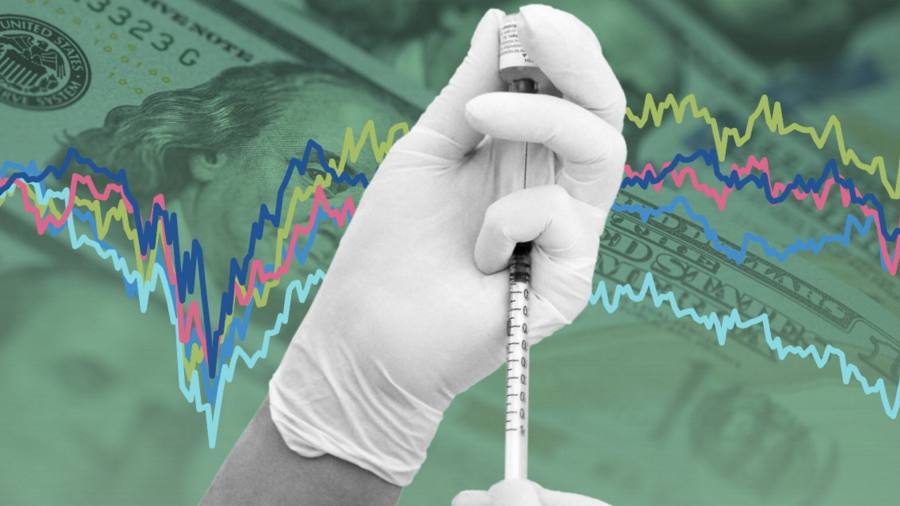The chief executives of the world’s largest pharmaceutical companies brought $1.4tn of dealmaking firepower to their industry’s flagship conference this week, according to an analysis by EY.
Yet few pulled the trigger.
Last year the value of dealmaking in the pharma and biotech sectors fell to its lowest level in five years, a 38 per cent year-on-year decline to $199bn, according to Refinitiv data.
There has been no pick-up so far in January, when deals often coincide with the JPMorgan Chase healthcare conference, which was held this week in San Francisco, California.
The UK’s AstraZeneca, French group Ipsen, Germany’s BioNTech, Italian group Chiesi and life sciences company Qiagen announced takeovers worth a combined $5bn — small change for the industry.
Only 66 healthcare deals have been announced in the first couple of weeks of 2023, compared with 247 during the same period last year — the worst record in 20 years, according to Refinitiv data. Overall deal value is down 27 per cent to $4.9bn.
In pharma and biotech, there have been 22 deals announced so far this year, compared with 70 over the same period last year, though the overall value rose from $2.6bn to $4.4bn.
Dealmakers are the ultimate optimists and many believe that the market will improve, with hopes fuelled by Amgen’s agreement to buy Horizon Therapeutics for more than $28bn last month — the largest pharma deal announced for two years.
“The most optimistic sign for me going into 2023 was the ease and rapidity with financing packages, even for some of the largest deals, were coming together in December,” said Frank Aquila, a veteran dealmaker and lawyer at Sullivan & Cromwell.
As the EY analysis shows, big pharma is not short of cash. Executives also have a strategic reason to seek out acquisition targets, as most big companies face a looming patent cliff that will lead to the loss of exclusivity of key drugs.
Pfizer, which is flush with Covid-19 revenues and recently completed a handful of deals, told the conference it planned to purchase assets capable of generating $25bn in annual revenues by 2030.
Analysts said Merck might be compelled to return to dealmaking soon as its blockbuster cancer drug Keytruda, which is forecast to generate more than $30bn in revenues by 2028, will lose patent protection that same year.
But Barry Greene, chief executive of US-listed biotech Sage Therapeutics, said the macroeconomic environment was a deterrent.
“We need to get inflation under control. We need wars in Europe to stop. And we still don’t know what the Fed’s going to do [with interest rates]. And then in the United States we have the Inflation Reduction Act, which is bad law,” he told the Financial Times on the fringes of the conference.
The Inflation Reduction Act — passed by the Biden administration last year — represents the biggest shake-up in drug pricing laws in the US for decades. For the first time it hands the federal government the power to negotiate prices for the some of the most expensive drugs purchased by Medicare, the taxpayer-funded healthcare scheme for retirees.

The pharma sector alleges that the law — which is estimated to produce savings worth more than $238bn in a decade — is flawed and will make it uneconomic for them to develop certain types of drugs.
Paul Hudson, chief executive of Sanofi, said the act should be renamed the “innovation reduction act” and was feeding deal phobia. “People are clearly hesitant,” he said. “We saw it recently with some of the other deals and what happened to SeaGen.”
Merck reportedly pulled out of talks to buy US oncology company SeaGen late last year, a deal that could have been worth up to $40bn.
The last large-scale, transformational pharma deal valued above $30bn was AstraZeneca’s purchase of Alexion for $39bn in December 2020. Lawyers have said tougher scrutiny of the sector by regulators has raised transaction risk.
“The Federal Trade Commission is being quite aggressive. They are looking at some transactions on a pre-merger basis and they are looking at private equity buyers that are serial acquirers,” said Michael Beauvais, co-head of strategic transactions practice at law firm Ropes & Gray.
“This is causing concern for companies because it can be disastrous if a publicly announced deal does not progress, particularly for a target,” he added.
Helen Sabzevari, chief executive of Precigen, a clinical stage firm developing gene and cell therapies, said big pharma was showing more interest in acquiring companies after a dip from the sky-high valuations during the biotech boom. But strong clinical data was key, she added.
“A lot of [biotech] companies went to IPO for a tremendous amount of market cap with very little data, often only pre-clinical data. And then people realised those valuations are really out of control. But I think we are getting back to the centre again . . . and those M&A opportunities exist again.”
Credit: Source link














